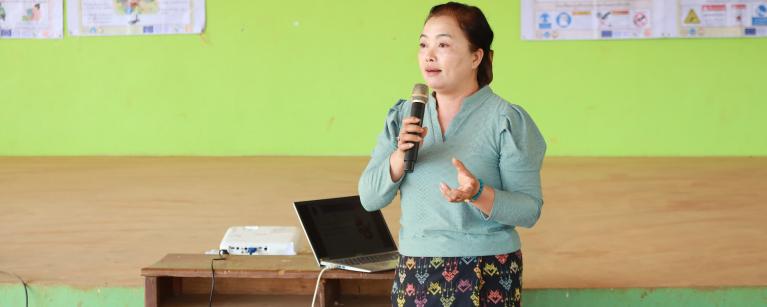SOLAR Project: Souliphone Sidavong, Coffee researcher devotes herself to training farmers

Souliphone Sidavong, Coffee researcher devotes herself to training farmers
As a researcher, farmer and all-around coffee connoisseur, Souliphone Sidavong knows pretty much everything one can know about coffee. “As far as I’m concerned, the best coffee is that which I’ve grown and processed myself,” she said with a fond smile, “because when I drink it, I feel deeply satisfied that I’m able to spend my life working in the coffee business.” Her passion for coffee cultivation and farmer empowerment has led her to teach local farmers about crop care and the importance of membership in the national social security scheme through training sessions supported by the SOLAR Project – a European Union-funded initiative implemented by the ILO and Oxfam.
Embracing her role as a mentor and researcher, Souliphone’s dedication to the coffee industry and community health reflects her unwavering commitment to empowering farmers and fostering a thriving agricultural community in the Lao People’s Democratic Republic. After completing her master’s degree at the Faculty of Agriculture of the National University of Laos, she secured a job at the Agricultural Research Centre of Southern Laos and moved to Paksong District. Today she is the centre’s Deputy Head of Engineering and is involved in the production of coffee seedlings as well as studying better ways to care for coffee crops.
As part of her role at the Agricultural Research Centre, Souliphone teaches farmers about new coffee seedlings and ways to protect their plants against insects and diseases. Through her efforts, farmers are also learning about occupational health and safety and the importance of social security, including the National Health Insurance scheme, which she views as particularly important in a sector like agriculture where accidents can be all too common. They can also be very unexpected, which she illustrated by recalling a recent incident in which a local coffee farmer was bitten on the mouth by a venomous green pit viper, which left her in agony before receiving proper care at the hospital (thankfully, she has fully recovered). “In my opinion, social security, safety and health are very important for farmers,” Souliphone noted. “The most important thing for humans is happiness, and you can never be happy if you’re not healthy. No matter how much you earn or how many possessions you have, it amounts to nothing if you become ill.”
As a result of her training, farmers have developed an increased interest in social security and occupational health and safety, and this year she has 40 training sessions planned. Souliphone conducts her training sessions with support from the ILO through the SOLAR Project. Her training career first began when she enrolled in a training of trainers programme by the ILO in 2019. Her first training sessions began shortly thereafter with two coffee production groups, and in 2021, this work was expanded to also include training for tea farmers in the region. Souliphone says that when she is running her training sessions, she does not feel like she is a trainer, but rather considers herself as a researcher who shares her experiences and challenges with others. She says she always learns from those she is teaching, and she hopes to improve herself further and gain more and more experiences because of her ongoing desire to explore and learn. Indeed, Souliphone’s commitment to coffee farming extends beyond the research centre and the training room to her own one-hectare coffee farm, where she cultivates tens of thousands of coffee plant seedlings that she sells to other farmers.
Even though she has spent her whole life among coffee and tea plantations, she says that she never tires of this environment and hopes to continue in this line of work until her retirement. “I feel happy and relaxed when I walk around coffee plantations and talk to farmers in the morning and evening,” she said And because apparently coffee research, coffee cultivation and training coffee farmers is not enough, she is also contemplating one day running a small café in her local town, where she can meet up with other coffee drinkers and producers and discuss shared interests. It is probably safe to say that it will be the best – or at least most heavily researched – cup of coffee around.